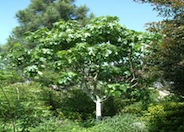
Common name:Rosemary
Botanical name:Rosmarinus officinalis
Rosemary is hardy in full sun areas where winter temperatures do not drop below 10 degrees F. They can be grown in a clay pot with well-drained, porous soil in bright indoor light, and will also flourish on the backporch in spring, summer and fall. Its beautiful, slowly trailing stems and shiny slender leaves are perfect for showing off the small, light blue flowers that blossom in the summer. -Holland WIldflower Farm

Common name:Lamb's Ears
Botanical name:Stachys byzantina
This tiny, herbaceous shrub will grow less than 1' tall and has medium sized, grayish green leaves with blue and lavender flowers that bloom in the spring.

Common name:Blue Fescue, Blue Fescuegrass
Botanical name:Festuca glauca
This groundcover/grass will grow less than 1' tall and has small, blue green leaves.

Common name:Santa Barbara Daisy, Mexican Daisy
Botanical name:Erigeron karvinskianus
This low mounding perennial, with fine leaves and white to pinkish, daisy-like flowers, is an excellent asset to rock gardens.

Common name:Olive, European Olive
Botanical name:Olea europaea
This broad tree will grow to 40' tall and has small, gray green leaves with fleshy black fruit that appears in fall.

Common name:Bougainvillea, Barbara Karst
Botanical name:Bougainvillea 'Barbara Karst'
The large amount of flamboyant color on this species creates a wonderful accent in a garden. Varieties can be in bush or vine form; colors vary. Once established, they tend to be carefree. All varieties are susceptible to frost damage. The 'Barbara Karst' variety blooms bright red in full sun; more crimson if in shade. It blooms early and long.

Common name:Tuscan Blue Upright Rosemary
Botanical name:Rosmarinus officinalis 'Tuscan Blue'
The Upright Rosemary is an upright shrub that grows 3'-6' tall. It has dark green leaves and bright, showy, lavender blue flowers throughout the year. This shrub is drought tolerant and attracts butterflies. -Cornflower Farms

Common name:Climbing Rose
Botanical name:Rosa Climbing varieties
With its dark green foliage and fragrant flowers with full and double blooms, this upright shrub is generally grown as a vine or pillar rose. Climbing varieties come in many colors.

Common name:Spanish Lavender
Botanical name:Lavandula stoechas
This dense shrub grows 2'-3' tall with blue gray foliage and deep purple flowers that have large showy bracts near the top of the spikes. It is drought tolerant . - Cornflower Farms

Common name:California Sycamore
Botanical name:Platanus racemosa
The California Sycamore is a fast growing deciduous tree that reaches up to 40'-50' high. It tolerates heat, smog, as well as moist conditions; it is native to riparian areas. It can be drought tolerant once it's established if there is a high water table. It has interesting mottled bark when the tree is bare in winter. Leaves in fall are gold, red and orange, creating litter. It is beautiful all year round.

Common name:Fig Edible
Botanical name:Ficus carica
This small tree produces wonderful figs that are a brownish red color.

Common name:Bush or Dome Euphorbia
Botanical name:Euphorbia characias
This perennial will reach about 4' tall and has blue green leaves with bright green flowers that bloom from late winter to early spring.

Common name:Western Redbud
Botanical name:Cercis occidentalis
This deciduous shrub ranges from 6'-20' tall and 10'-15' wide. It is desirable for its magenta spring flowers, yellow to red fall color, and dangling winter seed pods. It is tolerant of many soil types, drought and oak root fungus. It attracts hummingbirds and butterflies. The Western Redbud can be found statewide in CA in the foothills below 4500' elevations in chaparral and woodland communities.
- Cornflower Farms
The Right Plant Right Place
Putting the right plants in the right places in the right groupings is both the challenge and art of good landscape design.
Click in the green box for more information
| Designer: | Perennial Corner |
Photographer: GardenSoft |
Soils and Compost:
Physical weed control, including mulching, or hand removal protects the watershed from harmful chemicals.
Water Saving Tip:
Mulching and adding compost to soil can minimize evaporation and help soil absorb and store water.
Integrated Pest Management:
Attract, or buy beneficial insects such as ladybugs and lacewings to control pest outbreaks in your garden.
